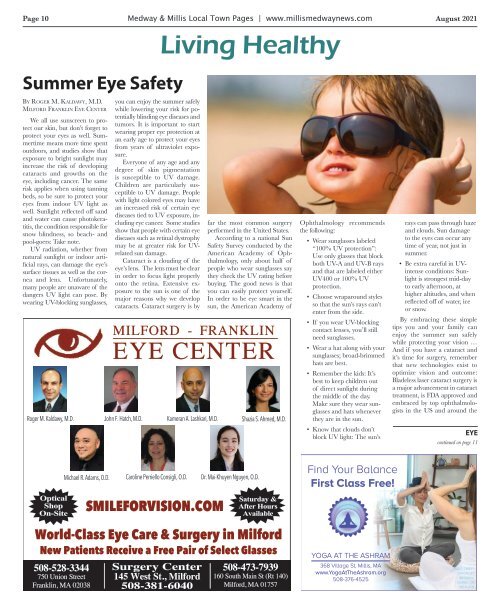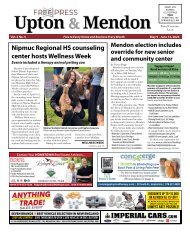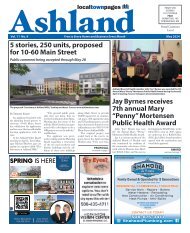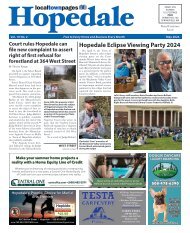Medway & Millis August 2021
Medway & Millis August 2021
Medway & Millis August 2021
Create successful ePaper yourself
Turn your PDF publications into a flip-book with our unique Google optimized e-Paper software.
Page 10 <strong>Medway</strong> & <strong>Millis</strong> Local Town Pages | www.millismedwaynews.com <strong>August</strong> <strong>2021</strong><br />
Summer Eye Safety<br />
Living Healthy<br />
By Roger M. Kaldawy, M.D.<br />
Milford Franklin Eye Center<br />
We all use sunscreen to protect<br />
our skin, but don’t forget to<br />
protect your eyes as well. Summertime<br />
means more time spent<br />
outdoors, and studies show that<br />
exposure to bright sunlight may<br />
increase the risk of developing<br />
cataracts and growths on the<br />
eye, including cancer. The same<br />
risk applies when using tanning<br />
beds, so be sure to protect your<br />
eyes from indoor UV light as<br />
well. Sunlight reflected off sand<br />
and water can cause photokeratitis,<br />
the condition responsible for<br />
snow blindness, so beach- and<br />
pool-goers: Take note.<br />
UV radiation, whether from<br />
natural sunlight or indoor artificial<br />
rays, can damage the eye’s<br />
surface tissues as well as the cornea<br />
and lens. Unfortunately,<br />
many people are unaware of the<br />
dangers UV light can pose. By<br />
wearing UV-blocking sunglasses,<br />
you can enjoy the summer safely<br />
while lowering your risk for potentially<br />
blinding eye diseases and<br />
tumors. It is important to start<br />
wearing proper eye protection at<br />
an early age to protect your eyes<br />
from years of ultraviolet exposure.<br />
Everyone of any age and any<br />
degree of skin pigmentation<br />
is susceptible to UV damage.<br />
Children are particularly susceptible<br />
to UV damage. People<br />
with light colored eyes may have<br />
an increased risk of certain eye<br />
diseases tied to UV exposure, including<br />
eye cancer. Some studies<br />
show that people with certain eye<br />
diseases such as retinal dystrophy<br />
may be at greater risk for UVrelated<br />
sun damage.<br />
Cataract is a clouding of the<br />
eye’s lens. The lens must be clear<br />
in order to focus light properly<br />
onto the retina. Extensive exposure<br />
to the sun is one of the<br />
major reasons why we develop<br />
cataracts. Cataract surgery is by<br />
far the most common surgery<br />
performed in the United States.<br />
According to a national Sun<br />
Safety Survey conducted by the<br />
American Academy of Ophthalmology,<br />
only about half of<br />
people who wear sunglasses say<br />
they check the UV rating before<br />
buying. The good news is that<br />
you can easily protect yourself.<br />
In order to be eye smart in the<br />
sun, the American Academy of<br />
MILFORD - FRANKLIN<br />
EYE CENTER<br />
Roger M. Kaldawy, M.D. John F. Hatch, M.D. Kameran A. Lashkari, M.D. Shazia S. Ahmed, M.D.<br />
Ophthalmology recommends<br />
the following:<br />
• Wear sunglasses labeled<br />
“100% UV protection”:<br />
Use only glasses that block<br />
both UV-A and UV-B rays<br />
and that are labeled either<br />
UV400 or 100% UV<br />
protection.<br />
• Choose wraparound styles<br />
so that the sun’s rays can’t<br />
enter from the side.<br />
• If you wear UV-blocking<br />
contact lenses, you’ll still<br />
need sunglasses.<br />
• Wear a hat along with your<br />
sunglasses; broad-brimmed<br />
hats are best.<br />
• Remember the kids: It’s<br />
best to keep children out<br />
of direct sunlight during<br />
the middle of the day.<br />
Make sure they wear sunglasses<br />
and hats whenever<br />
they are in the sun.<br />
• Know that clouds don’t<br />
block UV light: The sun’s<br />
rays can pass through haze<br />
and clouds. Sun damage<br />
to the eyes can occur any<br />
time of year, not just in<br />
summer.<br />
• Be extra careful in UVintense<br />
conditions: Sunlight<br />
is strongest mid-day<br />
to early afternoon, at<br />
higher altitudes, and when<br />
reflected off of water, ice<br />
or snow.<br />
By embracing these simple<br />
tips you and your family can<br />
enjoy the summer sun safely<br />
while protecting your vision …<br />
And if you have a cataract and<br />
it’s time for surgery, remember<br />
that new technologies exist to<br />
optimize vision and outcome:<br />
Bladeless laser cataract surgery is<br />
a major advancement in cataract<br />
treatment, is FDA approved and<br />
embraced by top ophthalmologists<br />
in the US and around the<br />
EYE<br />
continued on page 11<br />
Michael R. Adams, O.D.<br />
Caroline Perriello Consigli, O.D.<br />
Dr. Mai-Khuyen Nguyen, O.D.<br />
Find Your Balance<br />
First Class Free!<br />
Optical<br />
Shop<br />
On-Site<br />
SMILEFORVISION.COM<br />
Saturday &<br />
After Hours<br />
Available<br />
World-Class Eye Care & Surgery in Milford<br />
New Patients Receive a Free Pair of Select Glasses<br />
508-528-3344<br />
750 Union Street<br />
Franklin, MA 02038<br />
Surgery Center<br />
145 West St., Milford<br />
508-381-6040<br />
508-473-7939<br />
160 South Main St (Rt 140)<br />
Milford, MA 01757<br />
YOGA AT THE ASHRAM<br />
368 Village St, <strong>Millis</strong>, MA<br />
www.YogaAtTheAshram.org<br />
508-376-4525<br />
PHOTO CREDIT<br />
PHOTO BY<br />
ANTONIKA<br />
CHANEL ON<br />
UNSPLASH

















